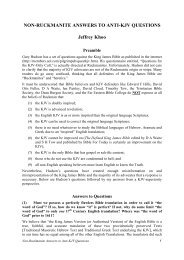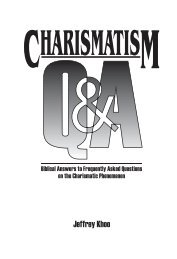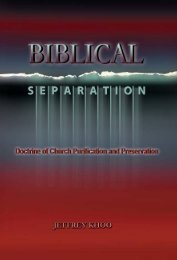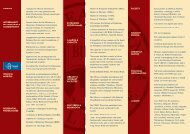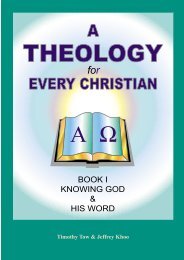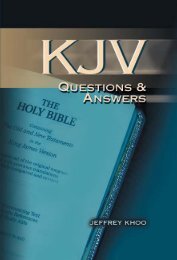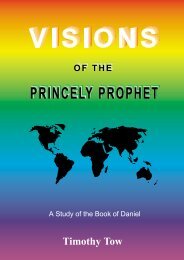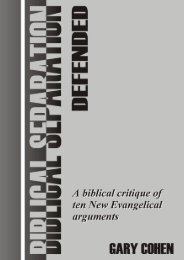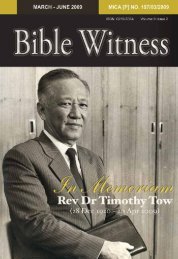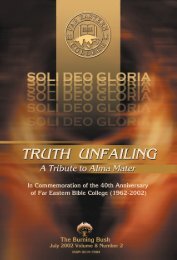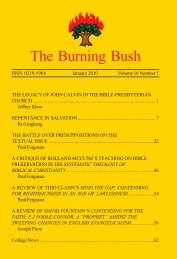50 Years Building His Kingdom - Far Eastern Bible College
50 Years Building His Kingdom - Far Eastern Bible College
50 Years Building His Kingdom - Far Eastern Bible College
You also want an ePaper? Increase the reach of your titles
YUMPU automatically turns print PDFs into web optimized ePapers that Google loves.
A Clear <strong>Bible</strong> Proof Text for<br />
the Doctrine of the Trinity<br />
A Preliminary Examination of the<br />
Antiquity and Authenticity of the<br />
Johannine Comma (1 John 5:7f)<br />
FIRST JOHN 5:7-8 in the King James<br />
(Authorized) Version reads, “For<br />
there are three that bear record (witness)<br />
in heaven, the Father, the Word, and<br />
the Holy Ghost: and these three are one.<br />
And there are three that bear witness in<br />
earth, the spirit, and the water, and the<br />
blood: and these three agree in one.” The<br />
italicized words constitute the Johannine<br />
Comma (Gk: koptein, “to cut off”). The<br />
Comma proves the doctrine of the Holy<br />
Trinity that “There are three persons in the<br />
Godhead: the Father, the Son, and the Holy<br />
Ghost; and these three are one God, the<br />
same in substance, equal in power and<br />
glory” (Westminster Shorter Catechism,<br />
Q6).<br />
Why is this verse seldom used to<br />
teach the doctrine of the Holy Trinity<br />
Other references are often cited, but why<br />
not 1 John 5:7f One will often reply, “How<br />
can I when my <strong>Bible</strong> does not have it”<br />
Therein lies the problem. With 1 John 5:7f<br />
missing in so many of the modern <strong>Bible</strong><br />
versions such as the New International<br />
Version, the Revised Standard Version and<br />
the New American Standard <strong>Bible</strong>, it is no<br />
wonder that many Christians are ignorant<br />
of this verse. And even if they do know<br />
that this verse exists, they hesitate to use it<br />
because they have been deceived into<br />
thinking that it is not part of God’s Word.<br />
The NIV Study <strong>Bible</strong>, for instance, says<br />
that 1 John 5:7f “is not found in any Greek<br />
manuscript or New Testament translation<br />
prior to the 16 th century.” On account of<br />
this they argue that 1 John 5:7 is spurious.<br />
It is not true that 1 John 5:7 is absent<br />
in all pre-16 th century Greek manuscripts<br />
and New Testament translations. The text<br />
is found in eight extant Greek manuscripts,<br />
and five of them are dated before the 16 th<br />
century (Greek minuscules 88, 221, 429,<br />
629, 636). Furthermore, there is abundant<br />
support for 1 John 5:7f from the Latin translations.<br />
There are at least 8000 extant Latin<br />
manuscripts, and many of them contain 1<br />
John 5:7f; the really important ones being<br />
the Old Latin, which church fathers such<br />
as Tertullian (AD 155-220) and Cyprian<br />
(AD 200-258) used. Now, out of the very<br />
few Old Latin manuscripts with the fifth<br />
chapter of First John, at least four of them<br />
contain the Comma. Since these Latin versions<br />
were derived from the Greek New<br />
Testament, there is reason to believe that 1<br />
John 5:7 has very early Greek attestation,<br />
hitherto lost. There is also reason to believe<br />
that Jerome’s Latin Vulgate (AD 340-<br />
420), which contains the Johannine<br />
Comma, was translated from an<br />
untampered Greek text he had in his possession<br />
and that he regarded the Comma<br />
to be a genuine part of First John. Jerome<br />
in his Prologue to the Canonical Epistles<br />
wrote, “Irresponsible translators left out<br />
this testimony [i.e., 1 John 5:7f] in the<br />
Greek codices.” Edward F. Hills concluded,<br />
“It was not trickery that was responsible<br />
for the inclusion of the Johannine<br />
Comma in the Textus Receptus, but the<br />
usage of the Latin speaking church.”<br />
This leads us to the so-called “promise”<br />
of Erasmus. Westcott and Hort advocate<br />
Bruce Metzger made this claim which<br />
became the popular argument against the<br />
Johannine Comma. He wrote, “Erasmus<br />
promised that he would insert the Comma<br />
Johanneum, as it is called, in future editions<br />
if a single Greek manuscript could<br />
be found that contained the passage. At<br />
length such a copy was found or made to<br />
order.” This view against the authenticity<br />
of 1 John 5:7f is parroted by many even<br />
today. Is this what truly happened H. J.<br />
de Jonge of the faculty of theology, Leiden<br />
University, an authority on Erasmus, says<br />
that Metzger’s view on Erasmus’ promise<br />
Page 87




